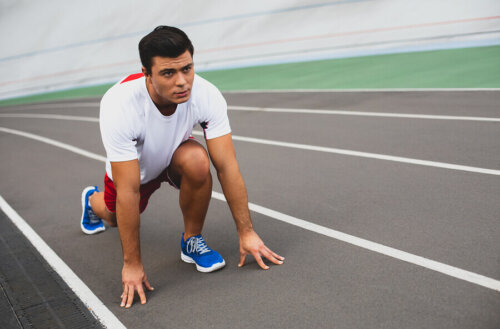A Global Overview of Sports Psychology

It’s very important for those who practice physical activity to know more about sports psychology. Therefore, we decided to share a global overview of this discipline in this article.
Sports psychology is a science not many consider relevant in the sporting world. However, it’s essential for athletes’ mental well-being.
Psychology is a science that studies human behaviors and mental processes. Over time, several branches derived from it, such as sports psychology, the psychology of learning, the psychology of art, educational psychology, and social psychology, among others.
Why do you need to know more about this science? The answer is simple: because mental health is essential for an athlete’s performance and comfort. In this article, we’ll give you a general overview of sports psychology. Keep reading!
Sports psychology
This science is difficult to define since it’s fairly recent and involves elements of physiology, kinesiology, sociology, and biomechanics.
The American Psychological Association states in Exercise and Sport Psychology that it, “Addresses the interactions between psychology and sports performance, including the psychological aspects of optimal athletic performance, the psychological care and well-being of athletes, coaches, and sports organizations, and the connection between physical and psychological functioning”.
On the other hand, the Association for Applied Sport Psychology points out the following: “It’s the scientific study of the psychological factors that are associated with participation and performance in sport, exercise, and other types of physical activity”.
Thus, it’s a science that studies the presence of sports and any type of physical activity in human thoughts and behaviors.

A healthy mind equals a good athlete
Athletes are exposed to situations and experiences that influence their mental processes. For this reason, sports psychology has the following main goals:
- Study athletes’ internal conditions to improve them. This way, they can reach their maximum physical, tactical, and technical potential during the preparation process.
- Provide help to control stress, emotional disorders, and the pressure of sports demands that can affect their performance.
- Work on the relationship between success and effectiveness in physical activity.
Thus, psychology and sports psychologists play a significant role in athletes’ and coaches’ lives, as well as all those involved in the sporting world. In short, it’s a great way to prevent mental problems caused by physical activity.
The sports psychologist
Sports psychologists are the means by which sports psychology fulfills its goals in athletes. Therefore, they have different work tasks and occupations:
- Their work area isn’t limited to an office but expands to an athlete’s field of activity.
- Advice and guide coaches, physical education teachers, teams, and athletes, among others.
- Performance profiling to determine the mental variables they need to help an athlete strengthen.
- Provide techniques to train mental abilities, such as stress management, anxiety, motivation, and fear, among others.
- If they have the tools and the situation is right, they can intervene if the athlete’s problem goes beyond the sports field.
Skills that sports psychology works
Sports psychology works with different skills an athlete needs. Here are some of them:
- Confidence and self-esteem. It’s very important to work on an athlete’s self-esteem and confidence. Both are determining factors in sports conduct.
- Concentration. Focus and the ability to avoid internal or external distractions are important and influence an athlete’s performance.

- Motivation. The fulfillment of goals, progress, and, also, effort, among other aspects, are essential in the sporting world.
- Relaxation. Athletes tend to demand a lot from themselves. Therefore, it’s important for them to learn how to properly relax, rest, sleep, and reduce muscle tension, among other things.
- Communication. Athletes must express themselves and have a good relationship with those around them. This way, they optimize their performance and how they work with their coach, team, and other members of the coaching staff.
In short, sports psychology is a very important science in the sporting world. Its main purpose is improving the mental processes involved in sports. For this reason, it’s essential to always be informed to preserve athletes’ mental well-being and enhance their performance and concentration.
It’s very important for those who practice physical activity to know more about sports psychology. Therefore, we decided to share a global overview of this discipline in this article.
Sports psychology is a science not many consider relevant in the sporting world. However, it’s essential for athletes’ mental well-being.
Psychology is a science that studies human behaviors and mental processes. Over time, several branches derived from it, such as sports psychology, the psychology of learning, the psychology of art, educational psychology, and social psychology, among others.
Why do you need to know more about this science? The answer is simple: because mental health is essential for an athlete’s performance and comfort. In this article, we’ll give you a general overview of sports psychology. Keep reading!
Sports psychology
This science is difficult to define since it’s fairly recent and involves elements of physiology, kinesiology, sociology, and biomechanics.
The American Psychological Association states in Exercise and Sport Psychology that it, “Addresses the interactions between psychology and sports performance, including the psychological aspects of optimal athletic performance, the psychological care and well-being of athletes, coaches, and sports organizations, and the connection between physical and psychological functioning”.
On the other hand, the Association for Applied Sport Psychology points out the following: “It’s the scientific study of the psychological factors that are associated with participation and performance in sport, exercise, and other types of physical activity”.
Thus, it’s a science that studies the presence of sports and any type of physical activity in human thoughts and behaviors.

A healthy mind equals a good athlete
Athletes are exposed to situations and experiences that influence their mental processes. For this reason, sports psychology has the following main goals:
- Study athletes’ internal conditions to improve them. This way, they can reach their maximum physical, tactical, and technical potential during the preparation process.
- Provide help to control stress, emotional disorders, and the pressure of sports demands that can affect their performance.
- Work on the relationship between success and effectiveness in physical activity.
Thus, psychology and sports psychologists play a significant role in athletes’ and coaches’ lives, as well as all those involved in the sporting world. In short, it’s a great way to prevent mental problems caused by physical activity.
The sports psychologist
Sports psychologists are the means by which sports psychology fulfills its goals in athletes. Therefore, they have different work tasks and occupations:
- Their work area isn’t limited to an office but expands to an athlete’s field of activity.
- Advice and guide coaches, physical education teachers, teams, and athletes, among others.
- Performance profiling to determine the mental variables they need to help an athlete strengthen.
- Provide techniques to train mental abilities, such as stress management, anxiety, motivation, and fear, among others.
- If they have the tools and the situation is right, they can intervene if the athlete’s problem goes beyond the sports field.
Skills that sports psychology works
Sports psychology works with different skills an athlete needs. Here are some of them:
- Confidence and self-esteem. It’s very important to work on an athlete’s self-esteem and confidence. Both are determining factors in sports conduct.
- Concentration. Focus and the ability to avoid internal or external distractions are important and influence an athlete’s performance.

- Motivation. The fulfillment of goals, progress, and, also, effort, among other aspects, are essential in the sporting world.
- Relaxation. Athletes tend to demand a lot from themselves. Therefore, it’s important for them to learn how to properly relax, rest, sleep, and reduce muscle tension, among other things.
- Communication. Athletes must express themselves and have a good relationship with those around them. This way, they optimize their performance and how they work with their coach, team, and other members of the coaching staff.
In short, sports psychology is a very important science in the sporting world. Its main purpose is improving the mental processes involved in sports. For this reason, it’s essential to always be informed to preserve athletes’ mental well-being and enhance their performance and concentration.
All cited sources were thoroughly reviewed by our team to ensure their quality, reliability, currency, and validity. The bibliography of this article was considered reliable and of academic or scientific accuracy.
- Brewer, B. W. (2009). Sport Psychology. Sport Psychology (pp. 1–139). Wiley-Blackwell. https://doi.org/10.1002/9781444303650
- Sharp, L. A., & Hodge, K. (2011). Sport psychology consulting effectiveness: The sport psychology consultant’s perspective. Journal of Applied Sport Psychology, 23(3), 360–376. https://doi.org/10.1080/10413200.2011.583619
- Weinberg, R. S., & Gould, D. (2010). Foundations of Sport and Exercise Psychology. Human Kinetics (pp. 179–199).
This text is provided for informational purposes only and does not replace consultation with a professional. If in doubt, consult your specialist.








